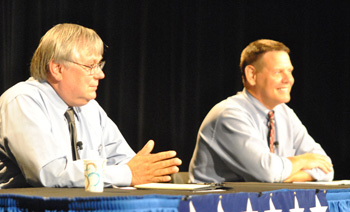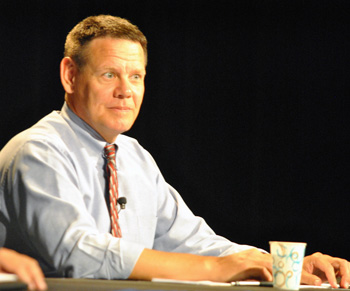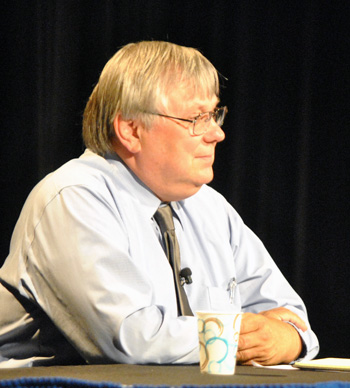Who’ll Be Next Water Resources Commissioner?
Next year, for the first time in more than two decades, someone other than Democrat Janis Bobrin will be Washtenaw County’s water resources commissioner. Harry Bentz and Evan Pratt are competing in the Aug. 7 primary to be the Democratic candidate for that position, with the winner facing Republican Eric Scheie in the Nov. 6 general election.

From left: Democrats Harry Bentz and Evan Pratt are running for the position of Washtenaw County water resources commissioner. (Photos by the writer.)
Scheie is not challenged in the primary, so it was only Bentz and Pratt who attended a July 9 candidate forum moderated by the League of Women Voters of the Ann Arbor Area. Questions asked during the 30-minute event covered issues directly related to the position, or dealt more broadly with water and environmental quality issues, such as fracking and the Pall/Gelman groundwater contamination. Other topics included regional collaboration, financing for drain projects, and the Allen Creek greenway in Ann Arbor.
Pratt emphasized his experience as a civil and environmental engineer, including work on local water resources projects. He also stressed the fact that he is endorsed by Bobrin. He noted his involvement with groups like the Huron River Watershed Council and the Ann Arbor planning commission. He stressed his financial experience – in managing projects and as treasurer for various professional groups.
Bentz stressed the importance of ordinary citizens getting involved in local government, and described the job of water resources commissioner as an administrative position. He put himself forward as an alternative to the “political machine” that he says had taken over local government. Bentz noted that he’s a lifelong resident of Washtenaw County, and could provide new blood in the political process.
Both Bentz and Pratt are Ann Arbor residents, as is the Republican candidate, Eric Scheie.
With offices on Zeeb Road in Scio Township, the office of the county water resources commissioner – formerly called the drain commissioner – is responsible for stormwater management, flood control, drainage systems and a wide range of other issues related to water quality throughout Washtenaw County. Recent projects include the Malletts Creek restoration, the RiverSafe public education program, and the Traver Creek stabilization project for a section that runs through the Leslie Park Golf Course.
The July 9 candidate forum was held at the studios of Community Television Network, and is available online via CTN’s video-on-demand service. Candidates gave opening and closing statements, and answered nine questions. The format was not designed for interaction between candidates, but each candidate was given an optional one-minute rebuttal to use once during the forum.
The deadline to register to vote in the Aug. 7 primary has passed. Oct. 9 is the last day to register to vote for the Tuesday, Nov. 6 general election. Information on voter registration can be found on the Washtenaw County clerk’s elections division website. To see a sample ballot for your precinct, visit the Secretary of State’s website. The League of Women Voters also has an online voter information site – Vote411.org – which includes biographical information on some candidates, stances on issues, and a “build my ballot” feature.
Opening Statements
Each candidate made a one-minute opening statement.
Pratt: The Washtenaw County water resources commissioner is responsible for the design, construction, operation and maintenance of over 500 stormwater management and flood control systems for county drains, Pratt explained. He directed viewers to his website for more information about his background, qualifications and supporters. Pratt said he offered three main commitments. He stands for being fair – to constituents, property owners and communities of all kinds. Second, he’d run a lean and financially prudent organization. Finally, he said he’s experienced at leveraging taxpayer money. He’s assisted the current water resources commissioner, Janis Bobrin, in securing and administrating nearly $17 million in water resource project grants.
Bentz: Every day we hear how the political process is controlled by lobbyists, special interest and the revolving door between business and politics, Bentz said. The only thing we can do to regain influence on our government is to have an ordinary working-class citizen step up and offer an alternative to the political machine that’s taken control over government positions. The position of water resources commissioner is an administrative position that should maintain a diverse staff of talented individuals, dedicated to customer service and the needs of citizens. It should never be a platform to hire industry consultants – people who’ll endorse unnecessary projects. “Please let your vote count,” he concluded, “and allow new blood in the political process.”
Purpose and Qualifications
Why are you running for water resources commissioner, and what makes you the better qualified candidate?
Pratt: The main reason he’s running, Pratt said, is because he has a passionate interest in protecting our natural resources, protecting the river, and addressing pollution problems that have been around for years. He said he has devoted his entire career to this, through his service on the Huron River Watershed Council and other volunteer organizations that have focused on public service for the community. He agreed with Bentz that focusing on service to “the folks who are paying the bills” is the top priority. This position demands someone who’s anything but ordinary, Pratt said, and having a background – in engineering, planning and funding – will help him do an excellent job.
Bentz: He’s running because he’s a lifelong resident of Washtenaw County. What happens in this county concerns him. He’s seen mishandling of resources in the past, and damaging events like the Gelman groundwater pollution and the long-term consequences of those things. He said he’s a product of Washtenaw County – a graduate of Huron High, Washtenaw Community College and Eastern Michigan University. He’s proud to put his foot forward to be a candidate for this position.
Name Change
The position was previously called the drain commissioner. Explain the name change, and any larger vision this might indicate for your service.
Bentz: Previously, the drain commissioner only regulated levels in the lakes, and made sure that creeks and tributaries were properly maintained to prevent flooding and maintain proper water levels, Bentz said. It’s evolved into dealing with water quality issues and overall environmental quality issues involving water – especially with issues of contamination, industrial accidents and how to prevent pollutants from getting into the water system. It becomes a larger picture than just flood control, he said.
Pratt: The primary reason for the name change is that there were more drain commissioners in Michigan who had an interest in protecting water quality, Pratt said, and who felt their responsibility in their district was for water quality. The state enabling legislation – Public Act 40 of 1956, also known as the Drain Code – identifies the same statutory obligations now as in 1956, outlining the job’s parameters and responsibilities, he said. So while the statutory responsibilities haven’t changed, real pressures of water quality problems, more frequent flooding, “flashier” storm events – these are all things that have broader impact. He said he’s very familiar with the area’s major storm events, and with parts of the city of Ann Arbor and Washtenaw County that have a variety of issues. For example, in the southeast part of the county, the groundwater is higher than in general, he said. In Ann Arbor, he added, there have been some very flashy storm events in the southeast and southwest part of the community that have caused real problems.
Financing for Projects
Give us your specific ideas for increasing funds for maintenance of current infrastructure, as well as raising funds for new projects.
Pratt: One of the things that water resource commissioners throughout the state must contend with is statutory limitations on fundraising. Without a project, there is no funding source, he said: The folks who benefit are the folks who pay for the project. The unique feature in Washtenaw County is the city of Ann Arbor, Pratt explained, with its own stormwater ordinance and stormwater fee. It acts much like a water utility, he said – collecting funds from taxpayers in the city at large, from property owners who have water that drains through a storm drain. Then the city pools that money to do larger projects, because there are larger problems in the city. In more rural areas, the projects are more like the traditional drain work, he said, with primarily agricultural drains. There are not many opportunities in rural areas to raise additional funds, other than a direct cost and benefit. But Ann Arbor has been able to leverage about $17 million in grants off of its stormwater utility funds, which is a big benefit, he said.
Bentz: It’s no secret that funding sources are limited now and for the future, Bentz said. The state seems to be in a rollback, as is the entire economy. Therefore, we have to be careful about new projects, he said. The only new projects should be those that are absolutely necessary for public safety or health. We have to be careful that we don’t ambitiously initiate new projects that we don’t have the funding for, and that will ultimately fall back on the taxpayers. Taxpayers are in revolt about property taxes – they want a halt to it. The county has to maintain basic services, making sure these drain systems work, Bentz said, and that should be the primary focus.
Water as a Resource
This region prides itself on its water resources. What threats do you foresee in its both quality and quantity, and how would you counter those threats?
Bentz: The threats are difficult to deal with, he said. One of them is the invasive species that have hit our waterways. Using volunteers has been the most successful strategy, he said, to pull purple loosestrife, for example. Zebra mussels are another threat. Using chemicals is not a good option, he said. Prevention is probably the best method, making sure the public is educated that when they move their boat from one body of water to another, for example, they could potentially be carrying organisms with them that could contaminate the new body of water. Weather events are probably the most serious thing to deal with, he added, including floods or drought.
Pratt: The No. 1 issue Pratt said he hears as he’s out knocking on doors is fracking – the use of chemicals and high volumes of water to extract oil and natural gas. That’s a very serious concern, he said, and he knows some state legislators are working on it. A second concern has been around since the early 1980s following a court decision in Lake Isabella County that relates to wastewater treatment plants, Pratt said. Many communities have smart, managed-growth plans to help concentrate development in certain areas. Unfortunately, he said, private wastewater treatment plants are an opportunity for developers to expand development, while at the same time adding sources of wastewater discharge – primarily into the Huron River, where efforts are underway to limit the amount of wastewater discharge. He said he’s very supportive of smart growth.
Regional Collaboration
How does the office of water resources commissioner relate to the city of Ann Arbor and other municipal entities along the Huron River? Does the office facilitate collaboration?

Evan Pratt, candidate for Washtenaw County water resources commissioner in the Aug. 7 Democratic primary.
Pratt: Currently, the office facilitates collaboration, but it’s not a one-size-fits-all approach, Pratt said. He’d like to continue that approach of working with all communities based on their needs or desires. Many communities have pooled their resources to comply with the Federal Phase II Stormwater Quality requirements, for things like public education. Why should each community send out a flyer, he asked, when you can save money by developing one flyer that goes out to all the urbanized areas in the county and another one for the more rural areas. He said he wholeheartedly supports collaboration. If his department has a piece of equipment that’s not being used full-time, for example, he’ll find out whether another entity might want to rent it. The office should share equipment, labor and whatever they can.
Bentz: Referring to the previous question, Bentz said he agreed with Pratt about the issue of fracking, and it’s unfortunate that the issue can’t be affected at the local level. As for collaboration between other communities on the waterway, everyone faces similar threats, he said. Sometimes the upper river might get flooded, and other times it will be the lower river that gets flooded. Everyone needs to be flexible and support each other in those times. There is not one entity that can afford to take on major problems all by themselves. Having a disaster plan in place and making sure people are ready to respond is important, he said.
Standards and Enforcement
Are you satisfied with the current water quality standards and enforcement? If needed, what changes would you make in the standards and verification? As commissioner, what measures would you take to monitor the remediation of the Pall/Gelman dioxane contamination as a threat the water supply?
Background: Gelman Sciences was a medical-device manufacturer based on Wagner Road in Scio Township. It began pumping industrial wastewater into holding lagoons behind its factory in the 1960s. Contaminated groundwater leeched into underground aquifers, and by 1985, tests showed some local residential wells were contaminated with 1,4-dioxane, a substance that’s considered a carcinogen. Legal action by the state has forced cleanup action of the contaminated groundwater plume, which is ongoing and overseen by Washtenaw County’s 22nd Circuit Court. Pall Corp., a New York-based conglomerate, bought the company in 1997 and later closed the local facility. For additional background, see Chronicle coverage: “Residents Frustrated by Dioxane Decision.”
Bentz: The Pall/Gelman situation is appalling – no pun intended, he said. He’s lost friends that have lived in that plume. The current system of pumping out groundwater and putting it into Honey Creek, which flows into Barton Pond, is unacceptable, he said. He wasn’t sure if building an incinerator on the Pall/Gelman site would be an option. The situation has been “totally confused,” he said. We need to protect our water resources, he added, and those who polluted it should be the ones who pay for it.
Pratt: He, too, would like to see Pall’s cleanup move in a different direction, but he noted that the local government has limitations on its authority. It’s been driven a lot by the state, he said. A lot of people collaborated to get the best deal they could at the time, he said, “but these are different times.” He’d like to see a better deal. [Pratt did not indicate what that better deal might be, or who should advocate for it.] Secondly, he said, problems like that need to be prevented – like fracking, which Pratt said fits hand-and-glove with the Pall/Gelman situation. Collaborating with state legislators on these issues will be an important role for the water resources commissioner in the foreseeable future, he said.
Allen Creek Greenway
Give us your thoughts on further opening the Allen Creek in Ann Arbor. How would a greenway affect the drain? Explain what’s currently underway on the west side of West Park. This project has resulted in Ward 5 flooding and has redrawn many of the floodplain lines.
Background: In the early 20th century, Washtenaw County built drains through West Park to collect stormwater, and directed the flow of Allen Creek into underground pipes. In 2010, the city undertook a major renovation of West Park, driven in part by chronic flooding in certain areas of the park. [Parts of the park do lie in the floodway and floodplain. Maps indicating the location of the floodway and floodplain were recently revised by FEMA, independently of renovations to the park.]
The stormwater portion of the renovation project was undertaken in partnership with the county water resources commissioner’s office. It included installation of some underground water treatment units – swirl concentrators – on the west side of the park, in the north and south branches of the Allen Creek drain. The purpose was to divert some of the water from the stormwater system, treat it, and remove pollutants before reintroducing it into the system to flow eventually into the Huron River. But those swirl concentrators failed in late 2010, and since then work has been done in an attempt to address the problem. The city’s park advisory commission was given a detailed update at its January 2012 meeting, and were told at their meeting in June that final repairs would be finishing up this summer. Though some residents have argued that the project has resulted in more flooding in the area, city staff have disputed that claim.
Separately, an effort to create an Allen Creek greenway has been underway for several years, spearheaded by the Allen Creek Greenway Conservancy, a nonprofit group.
Pratt: After a pause, Pratt said he didn’t think he could conclusively say what has caused the flooding on the west side of Ann Arbor, but he does know that it’s been documented there for up to 100 years. It doesn’t appear that one specific project has caused it, but rather a collection of development in that area. If the water wants to get out of the stream, it doesn’t matter if the stream is enclosed or open, he said. Opening up the stream would likely make it quicker for water to get out – that’s something for people to think about, he said. A robust public process is the only way to solve that issue. The city and the office of the water resources commissioner have a strong history of listening to the public, Pratt said. His personal experience in working with over 100 water resources projects is that no matter what he’s learned at MIT or in working on projects over the years, the people who live in the neighborhood always know things that he and his team don’t know, and he can learn from them. He would look to the neighbors to help solve that problem.
Bentz: The real issue is how advocates for the greenway and for opening Allen Creek would come up with the money to facilitate the project they’re trying to do, Bentz said. The city won’t want to pay for it completely, he noted. There also needs to be a system that’s safe and efficient that works. If a greenway could provide parkland and a nice resource for people to see and use, that would be wonderful, he said. But he doubted whether the funding is available for that kind of “esoteric delight.”
Stormwater Utility Department
Would you advocate for the development of a stormwater utility department like many other municipalities have? What advantages and disadvantages do you see with that?

Rob Cross, a producer at the Community Television Network, attaches a microphone to the tie of Harry Bentz, a candidate for county water resources commissioner.
Bentz: He first asked for clarification on whether the question was directed at the county level. It was, answered Susan Greenberg, the forum’s moderator. Bentz said there are some examples of that in other communities, like a sewer system developed in the Chain of Lakes. As far as stormwater management, he said the current organization handles that pretty well.
Pratt: He’s worked with several public works departments as a consultant, sometimes working for them, sometimes just observing. He noted that he does training for about 100 public works officials each year. There are only two ways that departments operate – by working in organizational silos, or by creating an integrated system. Making that decision about how to operate depends on issues in the community, he said, and how the community wants to tackle those issues. Pratt said he personally favors keeping all of the public works and utility operations folded together, and having people cross-trained – thinking with a wide field of vision instead of focusing on just one area. The advantage to having an integrated operation is that people can work together to tackle difficult issues, particularly on the funding side. The disadvantage is that there’s some redundancy when the county works with communities that already have people who are very familiar with their own stormwater systems, he said.
Fracking
The issue of fracking has been mentioned in several responses during this forum. What role do you see for the water resources commissioner?
Background: Fracking is a term used to describe the drilling technique of hydraulic fracturing, used to extract gas and oil. Concerns have been raised recently about the practice coming to Washtenaw County. See Chronicle coverage: “County Board Tackles ‘Fracking’ Concerns.” The county does not have jurisdiction to regulate the practice.
Pratt: The state enabling legislation for zoning does not allow local entities of government to have any say in oil or gas operations, as natural resources. So the role of the water resources commissioner is to offer to provide expert testimony, which he says he has the background to provide. He would also rely on the Huron River Watershed Council, which he said has done a good job gathering hard data from around the country about issues related to fracking. The role of the water resources commissioner should be as an advocate, an expert, and to help in the public education process – letting people know what’s going on, and coordinating public forums or working with other agencies to do that. He thanked the county board of commissioners for putting time and energy into facilitating public debate on this issue.
Bentz: He said he agreed with Pratt. Fracking is an issue because Washtenaw County hasn’t historically been a natural gas-producing area. There’s some natural gas here, but to get the high volumes that companies want, they have to use fracking. It’s ironic, he said, because in general natural gas supplies are at an all-time high, and the prices are lower than what they have been in the past. So the advantage that companies will get from fracking is very limited, he said. It’s important for the water resources commissioner to stand as an opponent to this practice. Even though it can’t be affected at the local legislative level, every authority that stands against it sends the message, he said.
Closing Statements
Each candidate had two minutes for a closing statement.

Evan Pratt draws a number from a hat to determine the speaking order at the July 9 League of Women Voters forum. To the right is Judy Mich, one of the event's moderators.
Pratt: He thanked the league for their thoughtful questions – he said he probably could have answered some of them better, and he’d be happy to talk to people about any of these issues. Contact information is on his campaign website, he said.
The county’s retiring water resources commissioner, Janis Bobrin, has worked to improve water quality and solve flooding issues throughout the county for the better part of 24 years, Pratt said, and she supports him for this office. According to her, Pratt said, he’s the most qualified to ensure that the office of the water resources commissioner will continue as a leader in water resource protection, and she’s thrilled to support him on Aug. 7.
The water resources commissioner must have integrity, experience, financial and technical expertise, he said. “You really have to play with a full hand, and I’ve got these qualifications and more.” Pratt cited his 25 years of professional experience, including design and management of over 100 water resources projects. He wholeheartedly agreed with making a project as small as possible to solve a particular problem, as Benz had alluded to in his remarks. He said he’s a licensed professional engineer in Michigan and four other states, and a graduate of MIT’s civil and environmental engineering program. He has extensive community service leadership, including with the Huron River Watershed Council, the Ann Arbor planning commission, service on the Washtenaw County planning advisory board, and a lot of volunteer work with many professional organizations. He said he brings experience as a treasurer with some of those organizations, and as a board director for a multimillion-dollar business. “I know how to watch your money like it’s my own,” he said. He asked voters to consider these qualifications at the voting booth on Aug. 7.
Bentz: Other than being on stage with his band, Bentz said, this forum has been the best chance to see who he is and what his values are. Washtenaw is his county – he grew up and lived here all his life. He knows the issues – water, environmental and political. He said he’s seen mistreatment by our leaders on all of these fronts. He said he’s a candidate that the electorate can rely on as the other choice – who won’t have any agendas of expensive projects that will increase taxes. He owes no political favors to consultants, engineering firms or corporate political donors.
Bentz said he seeks to protect our water from acts of terrorism, industrial and transportation accidents, and intentional acts of environmental disregard. He also seeks to protect the populace from property damage, loss of crops from flooding, and the threat to public safety by using a proactive response to emergency planning. He’s hard-working and seeks to use the skills he’s mastered, along with his education and lifelong experiences. Every department in Washtenaw County is challenged by funding shortages, he said. He’ll take a major effort to preserve the department’s functions, enhance customer satisfaction, and diversify the staff to reflect the community’s standards. The Democratic Party is committed to equal opportunity for all. “I will have a culturally diverse staff,” he said.
The Aug. 7 primary will be the one chance that voters have to affect any control on our entire political system, Bentz said. This is the election that will determine the respective political candidates, and after that it will be a matter of party mechanics to determine a winner. “Look into your heart, at your values and what you expect from the Washtenaw County water resource commissioner, and cast your vote for me,” Bentz concluded.
The Chronicle would not survive without regular voluntary subscriptions to support our coverage of local government. Click this link for details: Subscribe to The Chronicle. And if you’re already supporting us, please encourage your friends, neighbors and colleagues to help support The Chronicle, too!





The current system of pumping out groundwater and putting it into Honey Creek, which flows into Barton Pond, is unacceptable, [Bentz] said.
Unacceptable how? The water that’s being pumped into Honey Creek (actually, not Honey Creek proper, but a tributary, which flows through our property) is extremely clean. The groundwater is pumped up, treated and cleaned, and then discharged into the creek. I agree that on the whole this strategy for containing the plume has been unsuccessful, but let’s not give the impression than we’re pumping dioxane-contaminated groundwater directly into the Huron River system.